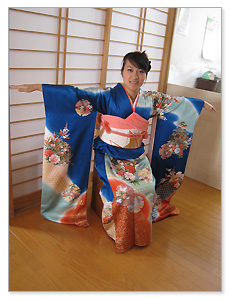- HOME
- Alumni News
- Nguyen Ngoc Anh (12th trainee)
- Anh's Final Report
Anh's Final Report
From a Seed to Blossom
Communication Barriers
I came to Japan on August 31, 2010. The members of staff from the Duskin Ainowa Foundation came to meet me at Kansai International Airport. I was surprised to see so many people there welcoming me – and everyone was very kind. But I was a little sad, because I could not communicate with them at all, having no Japanese. I also had a communication barrier when trying to talk to my fellow trainees. So, for about one week, I was very lonely and homesick.
For the first three weeks of the training, we studied Japanese. The daily Japanese class was so much fun and all the teachers were very kind. At first, Japanese was so difficult, but as the teachers taught us how to learn it more easily and with fun, I gradually began to speak the language.
Knowledge and Challenges
1. A new life
The first individual training took place at Independent Living Center Tekuteku. As it was the very first training on my own, I was very nervous and my heart was pounding when I greeted people there. But everyone was very warm hearted and fun loving, so I enjoyed the training every day. I studied the current situation of welfare in Kagoshima Prefecture, and visited special schools and hospitals. I also played wheelchair football and balloon volleyball. It was great fun. But, when playing the former, as I was not used to operating an electronic wheelchair that moves very quickly, I had no idea where the wheelchair was taking me. Also playing football in the electric wheelchair was very difficult.
The most memorable training was the Independent Living Program, ILP. I experienced a new life during this program, going to a supermarket alone daily and cooking a meal by myself in the independent living experience room. I felt very lonely at the beginning. Also, since I was I was not a great chef, so all my food went burnt. This made me feel even sadder and lonelier. But I did not give up – even when the food went black, I did not give up on cooking and tried again and again. Slowly but surely, I started cooking nice meals. The life in Kagoshima was all about making decisions by myself and taking responsibilities for my own actions.
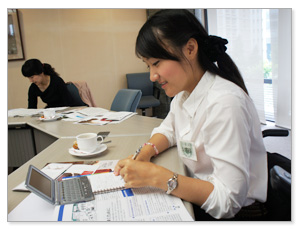
2. What made me happy
At the Ohyata Employment Support Center, I learned computer skills from teachers with cerebral palsy. The best part of this training was learning about how to create a webpage. The teachers taught me very skilfully. I had always wanted to study webpage design in Vietnam but had no opportunities. So I was delighted that I could at last learn it in Japan. Designing a webpage was very difficult and took me a lot of time to learn. Every night, I went back to my study after dinner and made efforts until three o’clock in the morning. It was a little tiring, but I was very happy when I finally created my own website.
3. I became strong
Between February 18 and April 2, I had an individual training program at Iruka Okinawa, an NPO Center for Independent Living. It was the longest training I had. I went to Osaka with the members of staff to study about inclusive education and visited the homes of the staff members with disabilities.
There was something that stunned me when I set foot in Okinawa. Okinawa looked a bit like Vietnam in the sense it was faced with a lots of challenges. Take public transport, for example. There are few non-step buses and there is no metro. Encountering so many obstacles, I almost felt like quitting the training half way through. But when I brought the issue up to the members and representative of Iruka, I learned the very simple fact that it is not easy to become a leader. It is not always fun. There are many things that are hard to tackle. One cannot become a leader without a strong sense of determination and commitment. It was a great learning opportunity for me.
The staff members with disabilities of Iruka were very proactive. They were always participating in some social activities, or engaged in the promotion of the rights of people with disabilities. Even though there were many issues or barriers, they did not give anything up and tried it harder with one another. Everyone at Iruka was so warm hearted and had so much energy and power. They were like the wind in Okinawa. I became strong, like the Okinawan wind, thanks to the people at Iruka who gave me a lot of power. Both the wind and the Iruka spirit reside within myself now.
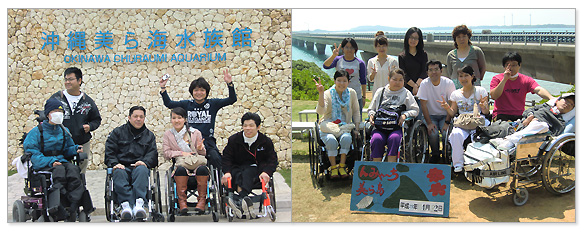
4. Fresh, tasty grapes
Between April 3 and 24, I had the individual training program at A.J.U. Center for Independent Living. A.J.U. I reminds me of an image of “grapes” in two ways. Firstly, many organizations and programs form A.J.U., looking like a bunch of grapes. Secondly, I associate A.J.U. with the tasty, fresh wine made by people with intellectual disabilities at Peer Nagoya. When I worked with everyone else in the vineyard in Tajimi, I discovered that it was not easy to make great wine. There were many issues to tackle, but everyone was working hard together as a team, even in the rain. Thus the wine is made with everyone’s love and efforts in it. When I tasted this wine I had three kinds of feeling. The first one was “I like it.” The second one was “I like it very much.” And the third one was “I love it!” I also participated in many other social activities. I joined in the Ajura dancing group and also helped to sell the wine at a department store, where we displayed pictures of people with disabilities in Asia as part of the awareness-raising program. It was a very meaningful activity.
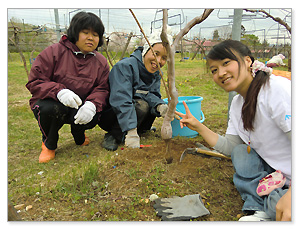
5. New knowledge
My last training took place at Human Care Association and DPI-Japan (Japan National Assembly of Disabled People’s International). Looking back on, I was very lucky to have these organizations included in my training. Human Care Association is the very first center for independent living opened in Japan and currently supports many centers for independent living in Vietnam.
During the week-long training, I learned about Human Care’s history and policy as well as the concept of peer counselling. The time passed too quickly – I wanted to learn a lot more. I had spent a lot of time studying about centers for independent living, so it was great that I received training at the DPI.
Unforgettable Memories
1. Love of Hokkaido
It had always been my dream to visit Hokkaido. On December 31, my dream came true! I was able to experience a one-week stay with the Sato family, which was wonderful. I did not feel coldness of Hokkaido at all, as I received love from my host family everyday. It was such a warm, unforgettable New Year.
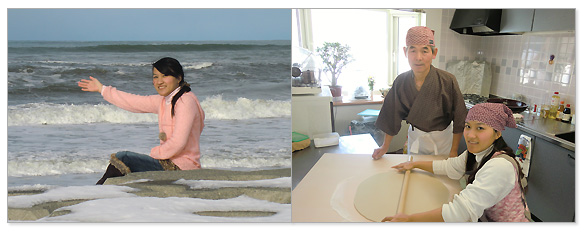
2. Ski training
In January, I had ski training for two days. It was the first time for me to ski. At first I was so nervous and worried about falling over. But the instructor made sure to keep me happy, so I began to relax. On the following day I fell over so many times. It was actually fun to fall over. I also gained a sense of triumph when I managed to finally ski all the way down to the bottom of the hill. I did not beat anyone; I beat the feeling of anxiety within myself. The ski training was a very meaningful experience.
3. What I would like to do back in Vietnam
I had a number of new experiences and learning opportunities during the ten months of the Duskin leadership training. The most memorable thing was learning the history of disability movement, independent living centers and Japan’s leadership training. I would like to take this wonderful knowledge back to Vietnam and make use of it in my future work for people with disabilities. I would like to initiate a variety of activities for them.
There still exist a number of barriers in Vietnam. I would like to cooperate with other people with disabilities and create a barrier-free society. I would like to go into town with everyone, go everywhere, check barrier-freeness of various locations and start negotiating with the government. I would also like to start a project on wheelchair-supply for people with disabilities in Vietnam. The people with disabilities in central Vietnam continue to face many difficulties, so I would like to establish a center for independent living in the region.
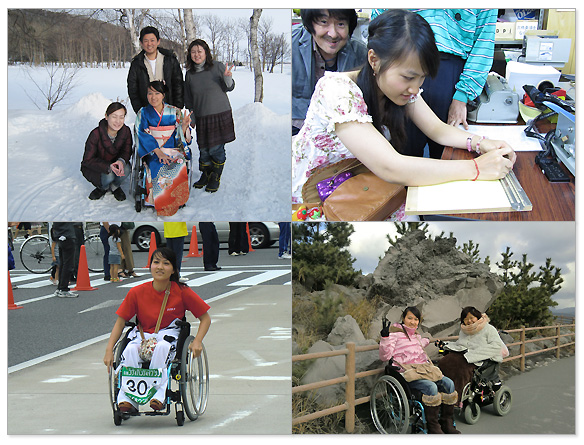
Concluding Remarks and My Gratitude
I received power and a seed of knowledge from Duskin. Over the last ten months, the tiny “seed” blossomed into a beautiful, powerful flower.
My dream is that more people with disabilities in Asia will receive this gift of “powerful seed”.
I would like to send my heartfelt thanks to everyone at the Duskin Ainowa Foundation and Japanese Society for Rehabilitation of Persons with Disabilities, and also to everyone else I met during the training. Thank you so much.
